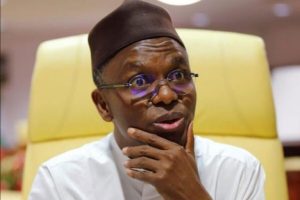
In some parts of Nigeria, it is often said that “Strength does not need to make noise.” Or, to put it in the language of modern political commentary, some men do not need to raise their voices to be heard, their presence alone changes the conversation. In the theatre of Nigerian politics, Mallam Nasir Ahmad El-Rufai fits that description perfectly.
The former Governor of Kaduna State has a knack for unsettling the political table without ever having to flip it over. Sometimes it is a throwaway comment at a public event, other times a cryptic post on social media. And yet, the ripple effects are often enough to send Abuja into overdrive.
This year, El-Rufai has played this familiar role with precision. His public remark that President Bola Ahmed Tinubu would “need a miracle” to secure re-election in 2027 was enough to trigger a sustained counter-offensive from the Villa. Old allies turned present adversaries have not held back, with presidential spokesman Bayo Onanuga taking the lead in questioning El-Rufai’s motives, even deploying the memorable but cutting phrase, “small man syndrome.”
Few politicians outside government command such sustained attention from those within. The exchanges follow a familiar script: El-Rufai makes a move, the Villa responds, political surrogates join the fray, and the headlines write themselves. It is almost choreographed.
But El-Rufai is no accidental participant. He understands that in politics, visibility is a form of capital, and he has long mastered how to deploy it. His critics may call it opportunism, his defenders describe it as conviction. Whichever view one takes, what is clear is that he has never hesitated to look power in the eye, whether it was with Umaru Musa Yar’Adua in the brief years of his presidency, Goodluck Jonathan in the season of insurgency and economic anxiety, Muhammadu Buhari through the pendulum swings of promise and disappointment, or with Bola Tinubu now.
Those who frame him as a restless political wanderer may be missing the point. El-Rufai’s movements have always been guided by what he considers principle rather than expedience. He threw his weight behind the APC when it promised reform, and when he judged the party had lost its way, he distanced himself rather than adjust his convictions to fit the new order.
Over the decades, from his days at the Bureau of Public Enterprises, through his tenure as FCT Minister, to his pivotal role in the 2015 opposition coalition, El-Rufai has been a consistent disruptor. His impact does not depend on holding office. Nearly two years after leaving Government House Kaduna, without the convoys and sirens, his voice still carries louder than the present occupant of Lord Lugard House. A single El-Rufai remark can set the trend of the week, travelling from State House briefings to political podcasts in every corner of the country.
This is why attempts to reduce his interventions to personal bitterness often fall flat. Nigerian politics has no shortage of men who will trade silence for comfort, but fewer who will walk away from power in order to preserve a clear conscience. El-Rufai belongs in the latter category.
Whether one agrees with his style or not, his continued relevance says as much about the fragility of our political culture as it does about his personal skill. In an environment where loyalty is often mistaken for obedience and dissent for betrayal, a politician who will tell a former ally “you are wrong” is bound to be polarising.
It is precisely this capacity for disruption that keeps the Villa’s apparatchiks on edge. They know that a single, well-timed intervention from El-Rufai can throw an entire news cycle off script, forcing them into defensive mode. And so their counterattacks must come quickly — often wrapped in the same tired labels: he is angry, he is bitter, he is looking for relevance. Yet, as any student of politics knows, in the politics of power, fear often hides behind rehearsed accusations.
And so, the El-Rufai phenomenon endures, not because he is the loudest in the room, but because he understands how to shape the conversation in it. In the unpredictable dance of Nigerian politics, he remains one of the few who can step away from the music yet still dictate the rhythm, proving that indeed, strength does not need to make noise.
– Amodu writes from Abuja. His email is amodudede@yahoo.com
The post El-Rufai And The Politics Of Disruption By Amodu Dede appeared first on Naija News.